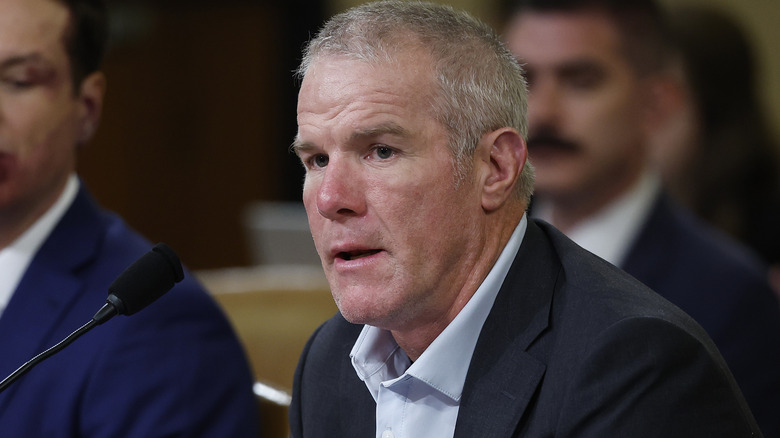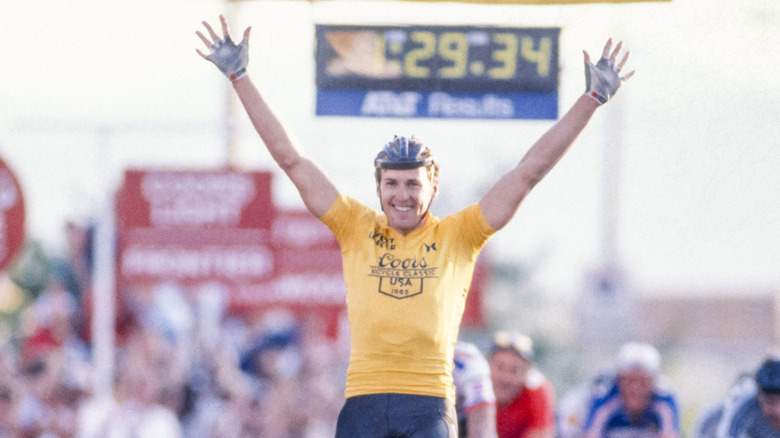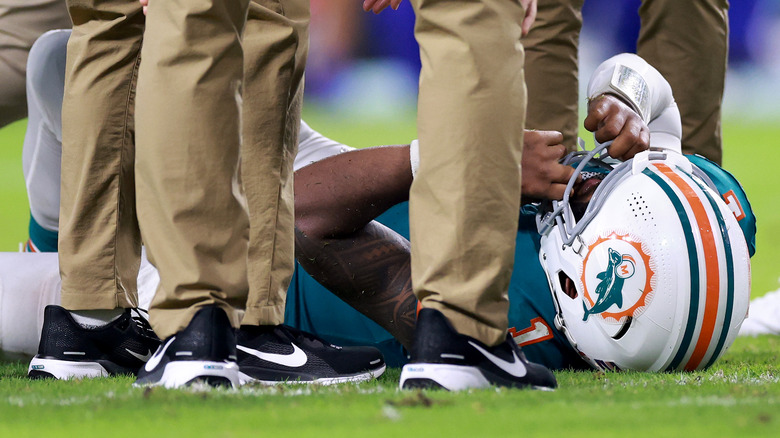Brett Favre And Other Famous Athletes That Have Parkinson's Disease
Legendary NFL quarterback Brett Favre revealed he was diagnosed with Parkinson's disease while testifying on Capitol Hill about his involvement in a Mississippi welfare scandal. "As I'm sure you'll understand, while it's too late for me — I've recently been diagnosed with Parkinson's — this is also a cause dear to my heart," Favre said (via the Associated Press).
Favre is one of 10 million people around the world living with Parkinson's, a brain disorder that damages the nerve cells that produce dopamine (per the Parkinson's Foundation). While actor Michael J. Fox has been open about his Parkinson's diagnosis since 1991, athletes like Favre have also been diagnosed with the disease. Most notably, boxing legend Muhammad Ali revealed his Parkinson's diagnosis three years after he retired from boxing. Ali died in 2016.
Athletes like NBA forward Brian Grant, MLB outfielder Kirk Gibson, and Tour de France cyclist Davis Phinney are currently living with Parkinson's, but Favre's diagnosis raises the question of the possible link between concussions and Parkinson's disease. Favre told Sports Illustrated that he suffered from at least three or four concussions in his lifetime, but maybe significantly more.
Other athletes' stories about Parkinson's
Cyclist Davis Phinney had been feeling fatigue, brain fog, and numbing weakness for several years after his retirement from cycling in 1993. It wasn't until 2000 that he was diagnosed with Parkinson's disease. He was only 40 years old. The Davis Phinney Foundation for Parkinson's has helped more than 1.5 million people with Parkinson's and their caregivers with resources on how to live well with the disease.
Baseball's Kirk Gibson was diagnosed with Parkinson's disease just before his 58th birthday. He said he suffered from anxiety while announcing the Detroit Tigers' Opening Day game in 2015. He felt his body lock up, and he couldn't talk after the game. These are some of the symptoms of Parkinson's you shouldn't ignore. "Little did I know the biggest challenge of my lifetime was about to come," he wrote on the Kirk Gibson Foundation page. "Two days later I was diagnosed with Parkinson's Disease, and I had no choice but to fight it."
Basketball star Brian Grant played for five teams in the NBA in 12 years, retiring in 2006. He was just 36 years old when he was diagnosed with Parkinson's. His diagnosis came two years after his retirement. He now gives inspirational speeches to help others live with Parkinson's. "Basketball gave me a life," Grant said. "Parkinson's taught me how to live it."
Are concussions linked to Parkinson's disease?
Most people with Parkinson's disease are diagnosed after age 60, but the National Institute on Aging says 10% of people have early-onset Parkinson's. That means they are diagnosed before the age of 50. Researchers are still puzzled by the causes of Parkinson's, but they believe it could be a mix of genetic factors and the environment.
One of those environmental factors could be concussions, according to a 2021 study in the Journal of Neural Transmission. Researchers compared 94 people who had Parkinson's with 70 people who didn't and found that having previous head trauma increased the risk of developing the disease. Most notably, the study found that sports-related head injuries were a particular risk factor for early-onset Parkinson's disease.
A larger study pointed out how concussions are linked to neurological and psychological disorders. The 2020 study published in Family Medicine and Community Health matched more than 47,000 people who had suffered concussions with those who had never had one. Those who had suffered concussions had a 57% higher risk of Parkinson's, a 72% higher risk of dementia, and a 72% higher risk of mood and anxiety disorders. (Read what a concussion does to your brain.)


